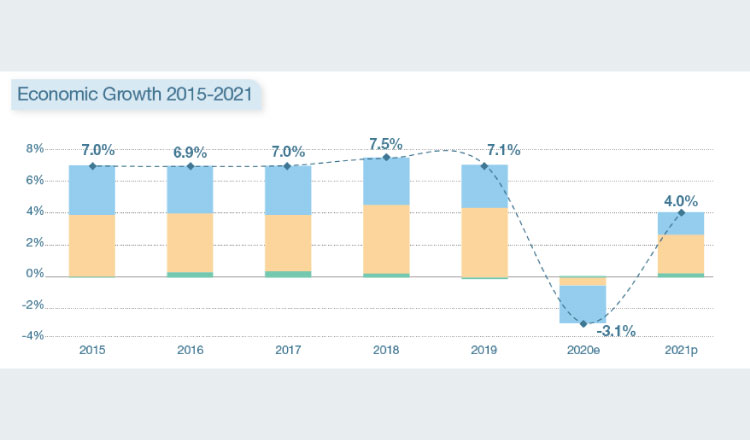E-commerce is pervading boundaries in Cambodia
Over 60 percent of the population is under 35 years old so it’s a very good opportunity for the e-economy to grow in Cambodia… the interaction between buyer and seller on e-commerce isn’t the same like people chatting at a local market. The mindset in Cambodia is such that people need to talk to each other like at Orussey market, says Chamroeun Mak, Board of Directors of Smile Shop
Even though the growth of online shopping platforms has grown a lot in size and number, especially in the recent two years during Covid, Facebook still dominates a large chunk of online shopping in the country with the number of its users has almost doubled in the last four years to reach close to 13 million.
Jack Lee, CEO, and co-founder of Cambodia’s digital shopping platform Smile Shop which sells just about every category of produce sees the limits of FB online sales. “I think the keyword is trust,” he told Khmer Times, adding, “After you pay for something on FB you can sometimes get a very bad product, and then trust is lost. On our platform we don’t allow all merchants to join, we select them. Plus, if there is an issue with any product the merchants sell, they have to answer to the customer. You must build trust on e-commerce and then you can be competitive with FB.”
Jack loves Cambodia, and after moving here in 2018 he was inspired to name his e-commerce platform after the famously warm smiles of Cambodians. He has developed Smile Shop to be tailored to the Cambodian market and meet its demands. Collaborating with Aeon, Smile Shop is to begin offering a unique type of credit service: “We’re trying to support people by developing what we call ‘Shop Now Pay Later’ which will allow customers get what they need when they need it. We know the market demand in Cambodia is there,” he says.
He is also well versed in strategies employed by the giants of e-commerce in China, like Pinduoduo and Suning, that use interactive options on their platforms to huge success, and he explains how they should be applied in the Cambodian context. “I think in the future live streaming sales in Cambodia can be done in combination with e-commerce,” Lee said, referring to a large number of sales made both on Facebook in Cambodia, and by big e-commerce platforms in China by people via live-streaming. “For the moment there is no incentive when you can just make cash sales on FB, but I think in the future that will change when the platform grows to a point where it can handle all the steps of the sale for the streamer.”
Chamroeun Mak, Board of Directors of Smile Shop, sees the particularities of Cambodia compared to other countries in Southeast Asia where e-commerce has seen a boom in recent years. “Over 60 percent of the population is under 35 years old so it’s a very good opportunity for the e-economy to grow,” he says noting that for many Cambodians “the interaction between and buyer and seller on e-commerce doesn’t have people chatting like at a local market. The mindset in Cambodia is such that people need to talk to each other like at Orussey market for example.”
According to a report by Bain & Co. e-commerce in Southeast Asia is expected to grow by 2025 to 3.5 times what it was in 2018. “I believe that the e-commerce still keeps growing around 18-20 percent in Cambodia,” said Mak. He’s optimistic that “once farmers start to consider the online market as their new market that’s when there’ll be a change in mindset.”
One hurdle for e-commerce Chamroeun says is education: “Even though we have a very young population, digital literacy is quite low. You see a lot of people that have iPhones but they use them for Facebook, TikTok and YouTube. Especially in the countryside. However, the market potential is there with 3 million farmers. The government could make more investments in infrastructure, internet coverage, and education in the rural areas to improve digital literacy.”
He was also critical of other aspects of government strategy. “In Cambodia, the right access to finance is needed. For example, what if a lot of farmers start to sell their products on Smile Shop and we connect them to the big Chinese platforms. Why doesn’t the government support this process with financing or tax exemptions like they do in Thailand?” he questioned.
When asked about the New Tax Law and how it promises to help e-commerce
Jack Lee said: “Actually, it’s not really much help. They just put more pressure on people who sell on Facebook requiring them to get a license to sell. They should do that, but they should also give people more room to grow.”

Chamroeun agrees: “The government needs to do monitoring, evaluation and give support for small businesses, not just ask taxes.” What about the initiatives of the different ministries to help businesses do e-commerce? “Sometimes they compete with each other,” he responded, adding, “I can see the good intentions but they have to align their initiatives so they can work smoothly together.”
Chamroeun points to one success story of the government in helping e-commerce: “Khmer Enterprise is one of the really good initiatives that support building tech start-ups and ends up including sectors such as tourism, manufacture, and agriculture which are all aligned with the growth of the e-economy,” he said.
Lee points out the biggest headache for e-commerce cross-border trade: “Delivery cost is the number one problem for international sales. The last time I tried to sell Kampot pepper to a client in China it cost more than double the cost of the product.”
Smile Shop Chief Operating Officer, Theab Sovannareth, was clear: “You need good roads and cold supply chain for transport of fresh produce, lowering of gas prices and electricity. The expressway from Phnom Penh to Sihanoukville and Phnom Penh to Bavet on the Vietnam border will make things much better.”
Chamroeun added: “I think that as the government gives more attention to improving e-commerce they will be more focused on improving roads, railways, and infrastructure.” Khmer Times







